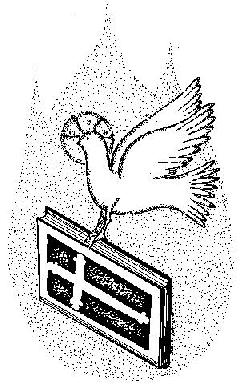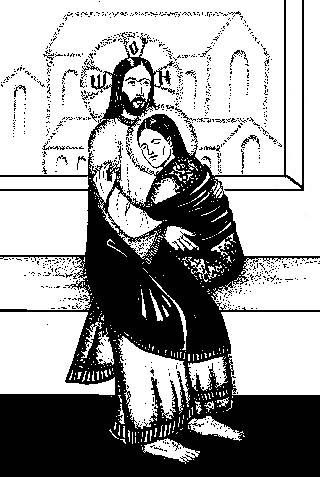
|
|
The Holy Spirit & The Apostles

| T |
he greatest gift Jesus Christ sent to His Apostles was the Holy Spirit. The
Apostles received actually two actions of the Holy Spirit. First, the Spirit
filled them with power to preach Jesus Christ, crucified and glorified, to
perform signs and wonders, healings and miracles in order to spread the Kingdom
of God among all who heard them. But the Spirit also performed a more hidden,
and perhaps more important work, since He strengthened the preaching and
witnessing of the Apostles. That was the working of the Holy Spirit in their
hearts to effect a living transformation into Christ.
Jesus
promised that the Holy Spirit would reveal to His Disciples all that Jesus had
ever said and done. The Apostles would understand all about Jesus in the
circumstances of their daily teaching and preaching.
The
Spirit would not only stay with the believers but He would also teach them the
truth of all Jesus had said and done. "...the Paraclete, the Holy Spirit,
whom the Father will send in My Name, will instruct you everything and remind
you of all I told you" (Jn 14: 25-27).
We need only
read in the Acts of the Apostles and the epistles of St. Paul the workings of
the Holy Spirit within that first Christian community. The Spirit that the Risen
Lord sends by asking His Father in glory is seen as the loving force of God
Himself divinizing all who were open to receive His Gift.
This
holiness is given to transform us into heirs of God, true children of God (Rm 8:
15; Gal 4:6). We receive the very indwelling of God's Spirit taking possession
of the Christian; penetrating mind, thoughts and actions with the life of God.
The
beautiful story of the conversion of the Roman centurion Cornelius that we find
in chapter 10 of the Acts of the Apostles illustrates the working of the Holy
Spirit in a universal way among people who are eager to receive a greater
knowledge of the living God. St. Peter understood, as he ministered to Cornelius
and his household, that "Jesus Christ is Lord of all" (Acts 10: 36).
Cornelius, by his great longing for God, received the gift of Baptism, the Holy
Spirit and proclaimed the greatness of God even better when he received the
Baptism of water.
The Spirit brings about a new
regeneration. Jesus Himself told Nicodemus, a member of the Jewish Sanhedrin who
came to Him at night seeking wisdom, that it is necessary to be reborn of water
and the Spirit (Jn 3: 5-6). The chief work of the Spirit in the days after
Pentecost until now in us is to bring a new life, a life in Jesus, which
regenerates us into children of God.
During one of the
festive Sundays after Easter, we hear the account of the Samaritan Woman at the
well. Jesus tells her directly: "Yet an hour is coming, and is already
here, when authentic worshippers will worship the Father in Spirit and truth.
Indeed, it is such worshippers the Father seeks. God is Spirit, and those who
worship Him must worship in Spirit and truth" (Jn 4: 23-24). Do we truly
listen to the Spirit each day and respond to God generously with our lives "in
Spirit and truth?"
|
On
Eagles Wings |

There is a
beautiful, tender, caring image of the Spirit of God presented in the Old
Testament. We read in the Book of Deuteronomy:
"As an
eagle incites its nestlings forth by hovering over its brood,
So
he spread his wings to receive them and bore them up on his pinions" (32:
11).
This eagle image was important to the Israelites who
often watched how the eagle would place an uncertain eaglet on its strong wings
and fly high into the sky. At a certain moment it would dip from under the baby,
leaving the eaglet alone in mid-air ~ to fly or come crashing down. The eagle
would quickly fly under the plummeting eaglet if it were not strong enough to
fly alone and hold the eaglet on its wings. Again and again the process was
repeated until the eaglet finally flew and at last became an eagle.
The
presence of the Spirit provides for us in the same way ~ protecting us in our
weakness and, at the same time, challenging us to greater life.
|
Apostle beloved of Tropar of St. John |
The symbol of the eagle is also used for the holy Apostle
and Evangelist John. The eagle is the only bird capable of flying directly
toward the sun. John's Gospel begins with the Prologue that tells us directly
that Jesus is the Word of God from Whom all enduring love comes, therefore the
eagle is a most fitting symbol.
John was "the Apostle
Jesus loved." It was John who rested his head on the chest of Jesus at the
Last Supper. And John alone who stood beneath the cross with Mary, the Mother of
God and the other faithful women. John accepted the gift of Mary as his own
mother when Jesus says from His Cross: "'Woman, your son.' In turn He said
to the disciple, 'There is your mother.' From that hour onward, the disciple
took her into his care" (Jn 19: 26-27). Mary, thus became the Mother of us
all.
John was the disciple who ran to the tomb early on
Easter morning when Mary Magdalene reported that: "The Lord has been taken
from the tomb" (Jn 20:2)! When John, who ran faster because he was a young
man, arrived at the tomb first, he waited for Peter, "the Rock," to
enter first. When John entered the empty tomb, the Scriptures report: "He
saw and believed" (Jn 20: 8).
After years of
proclaiming the Good News that Jesus is the Messiah, the Risen Christ, John was
exiled to Patmos by Emperor Domitian in an attempt to stop the spread of
Christianity. It was on the island of Patmos that John wrote his Gospel and the
Book of Revelation. John is called "the theologian" because his five
New Testament writings, i.e., the Gospel, Revelation and the three Epistles show
him to be "the breath of the Holy Spirit."
John
was over one hundred years old when he died. When his disciples later opened his
tomb, they found his body was not there. As a result, the expression "dormition"
or "falling asleep" is used for his death. In addition to his feast
day on May 8, we also celebrate his dormition on September 26.
|
Grandma's Lap |
Wisdom Speaks | ||
randma told us of a time when she sat at the bedside of an elderly woman who
was moaning and groaning on her death bed. The woman was afraid to die because
she feared God would punish her for her many sins. Grandma told her the
following story to comfort and encourage her. |
t. Cyril of Jerusalem compared the Holy Spirit to water. He chose this image
because of Christ's words: " He who believes in Me, as the Scripture has
said, 'Out of his heart shall flow rivers of living water.' Now this He said
about the Spirit, which those who believe in Him were to receive; for as yet the
Spirit had not been given, because Jesus was not yet glorified" (Jn 7:
38-39). |

THE HOLY SPIRIT
Source
of Holiness
| D |
uring His earthly life Our Lord promised that He would send a Paraclete to
us. He fulfilled this promise after He ascended to the Heavenly Father where He
took His seat at the Father's right. The Resurrected and glorified Christ calls
down the Holy Spirit upon the Apostles in the Upper Room. Jesus breathed on
them and said: "Receive the Holy Spirit. If you forgive men's sins, they
are forgiven them; if you hold them bound, they are bound" (Jn 20: 23).
The
Holy Spirit is the source of whatever holiness, whatever power, whatever gifts
there are among us. We pray at Sunday Matins: "The Holy Spirit is the
source of every divine treasure" (Tone Seven). And at the Vespers for the
feast of Pentecost our prayer expresses how totally dependent we are on the Holy
Spirit for everything:
"The Holy Spirit provides
every gift: He is the one who inspires prophecy and perfects the priesthood; it
is He who grants wisdom to the illiterate and turns simple fishermen into wise
theologians. Through Him divine order comes into the organization of the Church.
Glory to You, O Paraclete, equal in nature and majesty to the Father and the
Son!"
Our Lord fulfilled His promise, on the feast of
Pentecost. Manifested by a "strong wind and tongues of fire," the
Spirit filled the Apostles with His power and peace. They were filled with
the Holy Spirit whose presence and power they manifested to the various people
in Jerusalem. The people responded by asking: "What are we to do? Peter
answered: "You must reform and be baptized, each one of you, in the name of
Jesus Christ, that your sins may be forgiven; then you will receive the gift of
the Holy Spirit" (Acts 2: 37-38).
Saint Paul, who is
sometimes called "the Apostle of the Holy Spirit" relates that when we
are baptized, the Holy Spirit makes his dwelling in the believer. The Holy
Spirit thus communicates intimately and personally the life and love of each
person of the Blessed Trinity. With this gift of the Holy Spirit comes our
adoption into the family of God as a son or daughter. What a privilege it is to
become a child of God!
We Christians are aware that each
and everyone of us baptized "in the name of the Father, and the Son and the
Holy Spirit" is initiated into divine life, that is: the Holy Spirit dwells
in us and makes His abode in us. Let us, therefore, get to know better our
relationship with Him during this forthcoming year by recognizing His
manifestations in us. Let us also call upon Him to strengthen our faith in His
Word and the life communicated to us through the sacraments." O Good One,
save our souls."
| Go to Seminary's Home Page |
These
pages were designed by: MarMaPhASMaNaJ (© 1997 by Stamford Eparchy) |
Go to Eparchy of Stamford |